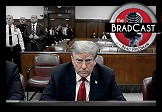 As we broke early last week, Sen. Russ Feingold (D-WI) brought his Reid-Feingold amendment, calling for defunding and an effective end to the Iraq War by a date certain (March of 2008), to the floor today. The measure failed to pass, but received 26 votes in favor, including all of those we named last week plus 16 or so more, all Democrats, including Presidential hopefuls Clinton and Obama, who supported such a measure for the first first time.
As we broke early last week, Sen. Russ Feingold (D-WI) brought his Reid-Feingold amendment, calling for defunding and an effective end to the Iraq War by a date certain (March of 2008), to the floor today. The measure failed to pass, but received 26 votes in favor, including all of those we named last week plus 16 or so more, all Democrats, including Presidential hopefuls Clinton and Obama, who supported such a measure for the first first time.
Greg Sargent has the list of Dems who voted for and against. David Swanson has more thoughts on the vote.
And we have Feingold's complete floor statement today posted below, in which he noted that in October of 1993, 76 Senators voted in favor of cutting off funding for the conflict in Somalia by March of 1994. "Many of them are still in this body," Feingold pointed out, "including Senators Levin, Cochran, Domenici, Hutchison, Lugar, McConnell, Specter, Stevens and Warner."
"Did those Senators jeopardize the safety and security of U.S. troops in Somalia?" he asked. "By cutting off funds for a military mission, were they indifferent to the well-being of our brave men and women in uniform?"
Not a single Republican, even those who voted to cut off funding for U.S. troops in Somalia, voted in favor of Feingold's amendment today.
Feingold's full prepared statement for today's Senate debate on the Feingold-Reid Amendment follows below...
On the Feingold-Reid Iraq Amendment
As Prepared for Delivery from the Senate Floor
May 15, 2007
Mr. President, as we speak, more than 150,000 brave American troops are in the middle of a violent civil war in Iraq, with more troops on the way. Meanwhile, the President has repeatedly made it clear that nothing – not the wishes of the American people, not the advice of military and foreign policy experts, not the concerns of members of both parties --- will discourage him from pursuing a war that has no end in sight.
Congress cannot wait for the President to change course – we must change the course ourselves. Iraq’s problems will not be solved by an open-ended, massive U.S. military engagement. And our own national security will be weakened until we bring this war to a close.
That is why, Mr. President, I am pleased to join the Majority Leader and Senators Dodd, Whitehouse, Sanders, Leahy, Kerry, Kennedy, Boxer, Harkin, and Wyden in introducing an amendment to bring this war to a close. Our amendment, which is the same as the Feingold-Reid bill, would require the President to begin safely redeploying US troops from Iraq within 120 days of enactment, and would require redeployment to be completed by March 31, 2008. At that point, with our troops safely out of Iraq, funding for the war would be ended, with three specific and limited exceptions: protecting U.S. infrastructure and personnel; training and equipping Iraqi security forces; and, perhaps most important, conducting “targeted operations, limited in duration and scope, against members of al Qaeda and other international terrorist organizations.” By enacting Feingold-Reid, we can finally focus on what should be our top national security priority --- defeating al Qaeda.
Defeating al Qaeda means recognizing that the U.S. presence in Iraq is being used as a recruiting tool for terrorist organizations from around the world. The longer we stay in Iraq, the longer that country will continue to be what the recently declassified National Intelligence Estimate called a “cause celebre” for a new generation of terrorists.
Defeating al Qaeda also means recognizing that it is not a one-country franchise, Mr. President. While we have been distracted in Iraq, terrorist networks have developed new capabilities and found new sources of support throughout the world. By redeploying our troops from Iraq, we can refocus on creating a more effective, comprehensive strategy to defeat these networks.
Consider how our efforts in Afghanistan, the country where the 9/11 attacks were plotted, have been short-changed by the Administration’s myopic focus on Iraq. Afghanistan has been put on the back-burner, and if we don’t strengthen our efforts to defeat the Taliban and to help create long-term stability in Afghanistan and the region, Afghanistan will remain what it was on 9/11 – a haven for those that seek to harm our country, and a bastion of instability with dire consequences for our national security.
Somalia is another instance in which the U.S. government response has been insufficient. Last fall, Mr. President, it became publicly known that the Administration had, for quite some time, been narrowly focusing on targeting terrorists in Somalia instead of taking a holistic approach to dealing with that country’s fragility and grave weaknesses. The situation on the ground continues to be unstable and tense, and the administration’s initial response – or lack thereof – suggests they were too focused elsewhere to properly address how failed states, terrorist safe havens, instability, and regional conflict can interlock to create chaos and lawlessness.
Mr. President, we can no longer ignore the rest of the world to focus solely on Iraq. We need a strategy for a post-redeployment Iraq and the region that allows us to refocus our global fight against al-Qaeda. Contrary to what the Administration has implied, al Qaeda is not abandoning its efforts to fight us globally so that it can fight us in Iraq.
As we redeploy from Iraq, and afterwards, we should continue to provide assistance to the Iraqi government and people. We should work with the Iraqi government, and key players in the region, to find a legitimate political solution that is inclusive and sustainable. We must not abandon the country and allow it to become another failed state, like Afghanistan in the 1990s or Somalia. If we do, al Qaeda will exploit it to its advantage.
But we cannot – we must not – allow this war to continue. It is time to end the war, Mr. President, and the way to do that is by ending funding for the war. That’s what the Feingold-Reid amendment does.
Some have suggested that cutting off funds for the war could mean cutting off funds for the troops. They would have people believe that, under my approach, our brave troops will be left to fend for themselves in Iraq, without training, equipment or resources.
Nothing could be further from the truth. Using our power of the purse to end our involvement in the war would in no way endanger our brave servicemembers. By setting a date after which funding for the war will be terminated --- as this amendment proposes --- Congress can ensure that our troops are safely redeployed without harming our troops
For those who don’t believe this can be done, let me cite an example from not too long ago. In October 1993, Congress enacted an amendment sponsored by the senior Senator from West Virginia cutting off funding for military operations in Somalia effective March 31, 1994, with limited exceptions. 76 Senators voted for that amendment. Many of them are still in this body, including Senators Levin, Cochran, Domenici, Hutchison, Lugar, McConnell, Specter, Stevens and Warner. Did those Senators jeopardize the safety and security of U.S. troops in Somalia? By cutting off funds for a military mission, were they indifferent to the well-being of our brave men and women in uniform?
Of course not, Mr. President. All of these members recognized that Congress had the power and the responsibility to bring our military operations in Somalia to a close, by establishing a date after which funds would be terminated.
That same day, several Senators supported an even stronger effort to end funding for Somalia operations. The amendment offered by Senator McCain would have simply eliminated funding to keep U.S. troops in Somalia. Funds would only have been provided to withdraw U.S. troops. I was one of 38 Senators who opposed a measure to table the McCain amendment. I can assure my colleagues that none of those 38 Senators was indifferent to the safety of our troops. We knew that the McCain amendment was an appropriate, safe, responsible way to use our power of the purse to bring an ill-conceived military mission to a close without in any way harming our troops. As Senator Hatch said at the time, “The McCain amendment provides the President with the flexibility needed to bring our forces home with honor and without endangering the safety of American troops.”
Mr. President, the same is true today of the Feingold-Reid amendment.
While Feingold-Reid is not the only amendment we are considering, it is the only amendment that would bring this war to a close. I regret to say that the Levin-Reid amendment accomplishes very little, once the President gets through certifying and waiving whatever he needs to certify and waive to keep his policies in place.
Levin-Reid would ensure that Congress receives more reports on Iraqi progress in meeting benchmarks. Mr. President, we don’t need reports to tell us that the President’s policy isn’t working. And we don’t need reports to show us that our continued military presence in Iraq is a mistake, one that the American people overwhelmingly oppose. It’s long past time for benchmarks, let alone benchmarks that aren’t tied to meaningful consequences. Feingold-Reid will move us toward ending the war. Levin-Reid will move us backward.
As long as the President's Iraq policy goes unchecked, our courageous troops will continue to put their lives on the line unnecessarily, our constituents will continue to pour billions of their dollars into this war, our military readiness will continue to erode, and our ability to confront and defeat al Qaeda will be jeopardized. I urge my colleagues to support Feingold-Reid and oppose Levin-Reid.


 Bad Climate News for Home, Car Owners; Good Labor News for Workers in the South: 'BradCast' 4/18/24
Bad Climate News for Home, Car Owners; Good Labor News for Workers in the South: 'BradCast' 4/18/24 'Green News Report' 4/18/24
'Green News Report' 4/18/24
 SCOTUS Suddenly Worried About Overcriminalization ... for J6 Insurrectionists: 'BradCast' 4/17/24
SCOTUS Suddenly Worried About Overcriminalization ... for J6 Insurrectionists: 'BradCast' 4/17/24 'Trump Media' Plummeting, MAGA Buyers Losing Life Savings: 'BradCast' 4/16/24
'Trump Media' Plummeting, MAGA Buyers Losing Life Savings: 'BradCast' 4/16/24 'Green News Report' 4/16/24
'Green News Report' 4/16/24 Trump's First Criminal Trial, for Cheating in 2016, Begins in NY: 'BradCast' 4/15/24
Trump's First Criminal Trial, for Cheating in 2016, Begins in NY: 'BradCast' 4/15/24 Sunday 'Party Like It's 1864' Toons
Sunday 'Party Like It's 1864' Toons Biden Closes 'Gun Show Loophole'; Repubs Turn Desperate: 'BradCast' 4/11/24
Biden Closes 'Gun Show Loophole'; Repubs Turn Desperate: 'BradCast' 4/11/24  'Green News Report' 4/11/24
'Green News Report' 4/11/24 'Pink Slime': Fake 'Local News' Sites Proliferating in Advance of Election: 'BradCast' 4/10/24
'Pink Slime': Fake 'Local News' Sites Proliferating in Advance of Election: 'BradCast' 4/10/24 Dirty Tricks and the Dirtiest Candidate Of All Time: 'BradCast' 4/9/24
Dirty Tricks and the Dirtiest Candidate Of All Time: 'BradCast' 4/9/24 'Green News Report' 4/9/24
'Green News Report' 4/9/24 'Titanic Law' Reform Just Tip of Iceberg in Quest for Key Bridge Accountability: 'BradCast' 4/8/24
'Titanic Law' Reform Just Tip of Iceberg in Quest for Key Bridge Accountability: 'BradCast' 4/8/24 Sunday 'Dark Days Indeed' Toons
Sunday 'Dark Days Indeed' Toons Trump's Very Bad Day in Court(s), Other Good (& Less Good) News: 'BradCast' 4/4
Trump's Very Bad Day in Court(s), Other Good (& Less Good) News: 'BradCast' 4/4 'Green News Report' 4/4/24
'Green News Report' 4/4/24 WI Supremes May Restore Drop-Box Voting
WI Supremes May Restore Drop-Box Voting WI Voters Approve Election Crippling Ballot Measures: 'BradCast' 4/3/24
WI Voters Approve Election Crippling Ballot Measures: 'BradCast' 4/3/24  Politico's Josh Gerstein Owes a Retraction
Politico's Josh Gerstein Owes a Retraction More GOP Election Fraud; Overdue Justice for Crystal Mason: 'BradCast' 4/2/24
More GOP Election Fraud; Overdue Justice for Crystal Mason: 'BradCast' 4/2/24 Last Week Today with OG Bloggers:
Last Week Today with OG Bloggers: It's Up to You, New York: 'BradCast' 3/21/24
It's Up to You, New York: 'BradCast' 3/21/24 'It All Comes Down to Brett and Amy': 'BradCast' 3/20/24
'It All Comes Down to Brett and Amy': 'BradCast' 3/20/24 American 'Bloodbath': 'BradCast' 3/19/24
American 'Bloodbath': 'BradCast' 3/19/24
 VA GOP VOTER REG FRAUDSTER OFF HOOK
VA GOP VOTER REG FRAUDSTER OFF HOOK Criminal GOP Voter Registration Fraud Probe Expanding in VA
Criminal GOP Voter Registration Fraud Probe Expanding in VA DOJ PROBE SOUGHT AFTER VA ARREST
DOJ PROBE SOUGHT AFTER VA ARREST Arrest in VA: GOP Voter Reg Scandal Widens
Arrest in VA: GOP Voter Reg Scandal Widens ALL TOGETHER: ROVE, SPROUL, KOCHS, RNC
ALL TOGETHER: ROVE, SPROUL, KOCHS, RNC LATimes: RNC's 'Fired' Sproul Working for Repubs in 'as Many as 30 States'
LATimes: RNC's 'Fired' Sproul Working for Repubs in 'as Many as 30 States' 'Fired' Sproul Group 'Cloned', Still Working for Republicans in At Least 10 States
'Fired' Sproul Group 'Cloned', Still Working for Republicans in At Least 10 States FINALLY: FOX ON GOP REG FRAUD SCANDAL
FINALLY: FOX ON GOP REG FRAUD SCANDAL COLORADO FOLLOWS FLORIDA WITH GOP CRIMINAL INVESTIGATION
COLORADO FOLLOWS FLORIDA WITH GOP CRIMINAL INVESTIGATION CRIMINAL PROBE LAUNCHED INTO GOP VOTER REGISTRATION FRAUD SCANDAL IN FL
CRIMINAL PROBE LAUNCHED INTO GOP VOTER REGISTRATION FRAUD SCANDAL IN FL Brad Breaks PA Photo ID & GOP Registration Fraud Scandal News on Hartmann TV
Brad Breaks PA Photo ID & GOP Registration Fraud Scandal News on Hartmann TV  CAUGHT ON TAPE: COORDINATED NATIONWIDE GOP VOTER REG SCAM
CAUGHT ON TAPE: COORDINATED NATIONWIDE GOP VOTER REG SCAM CRIMINAL ELECTION FRAUD COMPLAINT FILED AGAINST GOP 'FRAUD' FIRM
CRIMINAL ELECTION FRAUD COMPLAINT FILED AGAINST GOP 'FRAUD' FIRM RICK SCOTT GETS ROLLED IN GOP REGISTRATION FRAUD SCANDAL
RICK SCOTT GETS ROLLED IN GOP REGISTRATION FRAUD SCANDAL VIDEO: Brad Breaks GOP Reg Fraud Scandal on Hartmann TV
VIDEO: Brad Breaks GOP Reg Fraud Scandal on Hartmann TV RNC FIRES NATIONAL VOTER REGISTRATION FIRM FOR FRAUD
RNC FIRES NATIONAL VOTER REGISTRATION FIRM FOR FRAUD EXCLUSIVE: Intvw w/ FL Official Who First Discovered GOP Reg Fraud
EXCLUSIVE: Intvw w/ FL Official Who First Discovered GOP Reg Fraud GOP REGISTRATION FRAUD FOUND IN FL
GOP REGISTRATION FRAUD FOUND IN FL


































